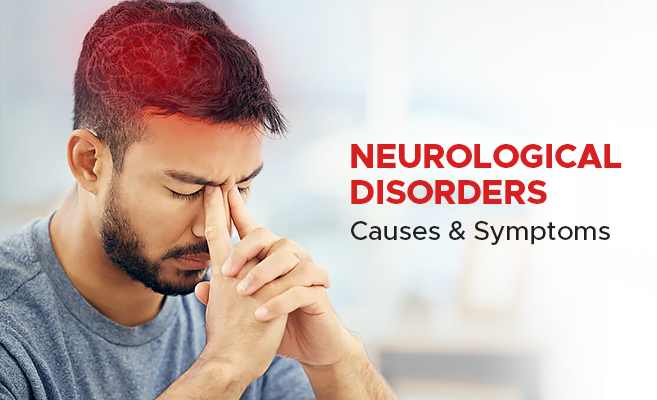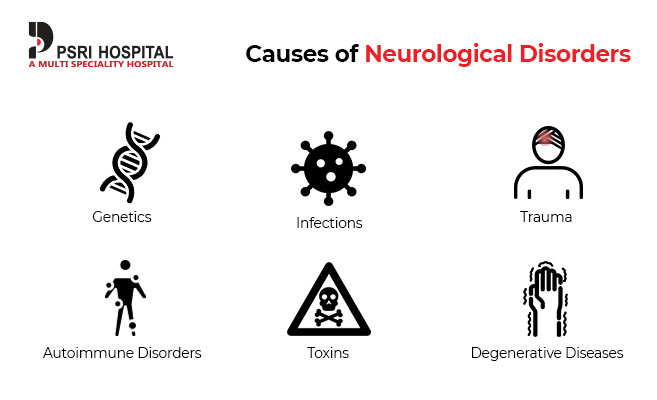5 Common Neurological Disorders: Causes & Symptoms

Neurological disorders may sound complex, but they affect millions of people worldwide. These disorders can have a significant impact on a person’s life, but understanding their causes and symptoms is the first step towards managing them effectively. In this blog, we’ll break down some common neurological disorders symptoms and causes to watch out for. Knowing these can definitely help you in managing your neurological disorders at early stages. So, let’s start.
What Are Neurological Disorders?
Disorders of the nervous system, which includes the brain, spinal cord, and nerves, are referred to as neurological disorders. Our motions, thoughts, and bodily functions are all controlled by signals that are sent by the neurological system, which is like the body’s command centre. A neurological condition can occur whenever something goes wrong in this complex system.
Causes of Neurological Disorders

- Genetics: Our parents may have passed on some neurological conditions to us. These disorders are more likely to occur if specific genes are defective or mutated. Muscular dystrophy and Huntington’s disease are two examples of such illnesses.
- Infections: Infections like meningitis or encephalitis can harm and inflame the nervous system. Bacteria or viruses can bring on these infections and, if not treated right away, could result in long-term neurological issues.
- Trauma: Head injuries or other physical trauma can damage the brain and nerves, which can cause neurological problems. Even a moderate concussion can negatively impact brain function.
- Toxins: Exposure to certain chemicals, heavy metals, or drugs can damage the nervous system over time. Lead poisoning and drug abuse are examples of toxin-related causes of neurological disorders.
- Autoimmune Disorders: Sometimes, the immune system mistakenly attacks the nervous system. Conditions like multiple sclerosis fall into this category.
- Degenerative Diseases: These are conditions where the nervous system deteriorates over time. Alzheimer’s disease and Parkinson’s disease are common examples.
Common Neurological Disorders and Their Symptoms
Now that we know the causes of neurological disorders let’s explore some common neurological disorders and their symptoms. Migraines are intense headaches often accompanied by nausea and sensitivity to light and sound. Various factors, including stress, certain foods, or hormonal changes, can trigger them.
Migraines
Migraines are intense headaches often accompanied by nausea and sensitivity to light and sound. Various factors, including stress, certain foods, or hormonal changes, can trigger them.
Symptoms:
- Throbbing head pain, usually on one side
- Nausea and vomiting
- Visual disturbances (called aura)
- Sensitivity to light and sound
Epilepsy
Recurrent seizures, which can range in severity from mild to severe, are characteristic of the illness known as epilepsy. Seizures happen due to abnormal electrical activity in the brain.
Symptoms:
- Uncontrolled shaking or convulsions
- Loss of consciousness
- Confusion after the seizure
Alzheimer’s Disease
Alzheimer’s disease is a progressive brain disorder that affects memory, thinking, and behaviour. It is a type of dementia.
Symptoms:
- Memory loss, especially recent events
- Difficulty in problem-solving
- Personality changes
- Confusion
Parkinson’s Disease
Parkinson’s disease affects movement and can lead to tremors, stiffness, and difficulty with balance and coordination.
Symptoms:
- Tremors (shaking)
- Stiffness in muscles
- Slowed movements
- Balance problems
Multiple Sclerosis (MS)
Multiple sclerosis is an autoimmune disorder that damages the protective covering of nerve fibres in the brain and spinal cord.
Symptoms:
- Fatigue
- Muscle weakness
- Problems with coordination and balance
- Vision problems
If you are undergoing these kinds of neurological disorders symptoms, it is essential to get a consultation from the best neuro doctor in Delhi.
Seeking Help for Neurological Disorders
If you or a loved one experiences any of these symptoms, seeking medical advice from the experts of the best neurosurgery hospital in Delhi is essential. Early diagnosis and treatment can make a significant difference in managing neurological disorders and improving the quality of life. Neurologists are medical doctors who specialise in diagnosing and treating neurological disorders. The best neurologist near me in Delhi NCR may use various tests, such as MRI scans and blood tests, to assess the condition. Treatment options may include medication, physical therapy, and lifestyle changes.
Conclusion
Neurological disorders can affect anyone, but early detection and efficient treatment depend on an in-depth knowledge of their causes and symptoms. You must get medical attention and support if you have a migraine, epilepsy, Alzheimer’s, Parkinson’s, or multiple sclerosis. Keep in mind that neurological disorders can be complicated and that every person may have a different experience. Many people with these diseases can now enjoy happy lives with the proper care and support, thanks to breakthroughs in medical research and therapy. So, if you suspect you or someone you know may have a neurological disorder, don’t hesitate to reach out to our best neuro doctor in Delhi. At PSRI, the best neuro hospital in Delhi, we have years of experience in giving the required treatment for any type of neurological disorder. Book an appointment now to know more.
FAQs
Q 1: What are some common early signs of neurological disorders?
Answer: Early signs may include frequent headaches, numbness, memory problems, and balance issues. Consult a healthcare professional for evaluation.
Q 2: Are all neurological disorders genetic in nature?
Answer: No, many neurological disorders are not genetic; they can result from infections, trauma, toxins, autoimmune responses, or degeneration.
Q 3: Can neurological disorders be cured completely?
Answer: Outcomes vary, but some can be managed with treatment; others may not have a complete cure.
Q 4: What can I do to reduce my risk of neurological disorders?
Answer: Maintain a healthy lifestyle, protect your head, manage stress, avoid toxins, and stay informed about your family medical history.

 Book An Appointment
Book An Appointment Virtual Consultation
Virtual Consultation





